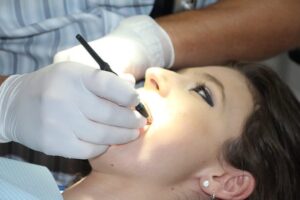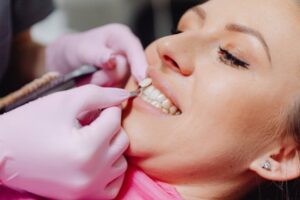A bright, confident smile is more than just a look it boosts your self-esteem. If you’re dealing with tooth loss, you’re not alone, and today’s tooth replacement options are better than ever. Whether caused by injury, decay, or other dental problems, there are solutions that can restore your smile.
It’s important to know your choices to make the best decision for your health. Curious to learn more? Keep reading to discover the best ways to get your smile back on track!

Table of Contents
Why Consider Tooth Replacement?
Tooth loss can cause problems like trouble chewing and speaking. It can also affect your self-esteem, making you feel less confident. These issues may worsen if left untreated.
If you don’t replace lost teeth, your jawbone can begin to shrink. This can lead to your remaining teeth shifting out of place. Over time, this can cause even more oral health problems.
Choosing the right tooth replacement is important for fixing your smile. It helps keep your mouth healthy and prevents further damage. A good replacement can also improve your confidence.
The Different Options for Tooth Replacement
There are several effective methods for tooth replacement, each offering unique benefits and considerations. Here, we take a closer look at popular alternatives:
1. Dental Implants
Dental implants are an advanced option for replacing missing teeth. They involve placing a titanium post into the jawbone, which acts as a base for a crown. This solution is known for its strength and stability.
Dental implants offer several benefits. They look and feel natural, making them a great choice for restoring your smile. They also help prevent bone loss by supporting the jawbone and can last a lifetime with proper care.
However, considering dental implants require good overall health and enough bone density. In some cases, the healing process can take time. Your dentist will evaluate these factors to determine if implants are the best choice for you.
2. Dental Bridges
Dental bridges are used to fill the gap left by missing teeth. They are made of artificial teeth (called pontics) that are attached to crowns on nearby natural teeth. This method helps restore both the look and function of your teeth.
One of the main advantages of bridges is that the procedure is faster than dental implants. They also help maintain the shape of your face by supporting your cheeks. Additionally, bridges make it easier to chew and speak.
However, getting a bridge means your adjacent teeth will need to be altered. Some patients may not like this change. Your dentist can help determine if a bridge is the right choice for you.
3. Dentures
Dentures are removable devices that replace missing teeth. Full dentures are used when all teeth are gone, while partial dentures work when some natural teeth remain. They offer a more affordable and less invasive option than dental implants.
One of the main benefits of dentures is their cost-effectiveness. They are also faster to make than other tooth replacement options. This makes dentures a great choice for people looking for a quicker solution.
However, dentures can sometimes feel uncomfortable and may need adjustments. They also do not prevent bone loss as well as implants do. Despite these drawbacks, dentures can still be a good solution for many people.
4. Implant-Supported Dentures
Implant-supported dentures are a combination of traditional dentures and dental implants, providing a stable solution anchored to implants in the jawbone. This approach offers the benefits of both methods, ensuring better stability than conventional dentures. It also helps preserve the jawbone by preventing the bone loss often associated with traditional dentures.
One of the key advantages of implant-supported dentures is the enhanced bite force compared to regular dentures. The implants prevent slipping, providing greater comfort and functionality for the wearer. Additionally, they act as a preventive measure against bone degradation, which can occur when teeth are missing for extended periods.
However, like traditional dental implants, implant-supported dentures typically require surgery and involve a longer treatment timeline. The procedure may also be more complex, as it necessitates careful planning and healing. Despite these considerations, the benefits of improved stability and bone preservation make them a viable option for many patients.
Factors Influencing Your Decision
When deciding on a tooth replacement solution, several factors should guide your choice:
1. Time Commitment
Different tooth replacement options require different amounts of time. Dental implants take longer because they involve surgery and require healing after placement. Bridges and dentures can usually be finished more quickly.
The process for dental implants is slower because of the need for surgery and recovery. This means you may need to wait a few months for the implant to fully heal before a final restoration can be placed. In contrast, bridges and dentures usually take less time from start to finish.
If you need a faster solution, bridges and dentures may be a better choice since they can be completed in a shorter period. Dental implants provide a more permanent solution, but the treatment duration is longer. The right option depends on how much time you can commit to the procedure.
2. Cost Considerations
The cost of replacing teeth can change depending on the option you choose. Dental implants can be more expensive at first because they involve surgery and special materials. However, they last a long time and may save you money in the long run.
Bridges and dentures are usually cheaper upfront compared to implants. They are quicker and easier to make, so they cost less initially. But over time, they might need repairs or replacements, which can add up.
While implants may cost more initially, their durability can make them a better investment. Bridges and dentures are less expensive initially, but the ongoing costs of maintenance can increase. The right choice depends on your budget and how long you want your replacement to last.
3. Aesthetic Preferences
Many people care about how their smile looks. Dental implants are often preferred because they look and feel like real teeth. They can help you smile confidently because they blend in naturally.
Dentures, on the other hand, may not look as natural as implants. While they can still improve your smile, they may not have the same realistic appearance. This difference can be important if you want a smile that closely resembles your natural teeth.
When choosing a tooth replacement, think about how you want your smile to look. If you want something that looks like real teeth, dental implants might be the best option. Consider your needs and appearance goals when making your decision.
4. Oral Health Status
Your current oral health affects the tooth replacement options available to you. Things like the health of your gums, the strength of your jawbone, and your overall health play a big role in what will work best. These factors need to be considered to find the right solution for you.
For example, if your gums are unhealthy or your jawbone is weak, it might limit some options. Dental implants, for instance, require a strong jawbone to hold them in place. If these conditions aren’t ideal, other options, like bridges or dentures, might be better choices.
To understand which option is right for you, it’s important to consult a dentist. A dental professional can carefully assess your health and guide you in making the best decision. They will help you consider all factors before moving forward with treatment.
Consulting a Dental Professional
When faced with tooth loss, consulting a dental professional is vital. They possess the expertise to evaluate your situation thoroughly and recommend the best tooth replacement options that align with your needs and lifestyle. Together, you can formulate a personalized treatment plan, ensuring a successful outcome.
Maintaining Your Tooth Replacement
Maintaining proper oral hygiene after a tooth replacement procedure is crucial for the longevity of your new restoration. Brushing twice a day with fluoride toothpaste helps remove plaque and bacteria that can lead to oral health issues. Flossing between your teeth and around any dental appliances is also essential for keeping the gums healthy and preventing the buildup of debris.
Regular dental check-ups and professional cleanings are vital to ensure your restoration remains in optimal condition. These visits allow your dentist to detect potential problems early and address any necessary adjustments. Consistent professional care supports the long-term health of both your restorations and your natural teeth.
Certain foods, particularly hard or sticky items, can jeopardize the integrity of your restoration. By avoiding these types of foods, you reduce the risk of damaging your tooth replacement and extend its lifespan. Adopting these practices contributes significantly to preserving the durability of your restoration and improving your overall oral health.
The Emotional and Psychological Impact of Tooth Replacement
Beyond the physical aspects, tooth replacement can have profound emotional and psychological effects. Many patients report feeling more confident and willing to engage socially after restoring their smiles. A restored smile can lead to increased self-esteem and reduced anxiety in social situations. Addressing tooth loss not only improves functionality but also enhances quality of life.
Restore Your Smile and Confidence Today
Picking the right tooth replacement can be a game changer for your health and confidence. Implants, bridges, and dentures each come with unique perks. Talk to a dental expert to get the advice you need and find the option that works best for you.
Don’t wait-start your journey to a healthier, more confident smile now. Ready to dive deeper? Check out our blog for more tips and advice on restoring your smile!




